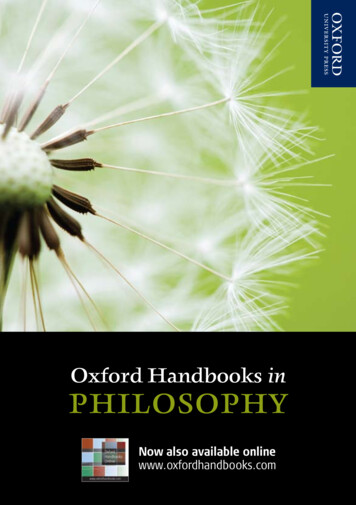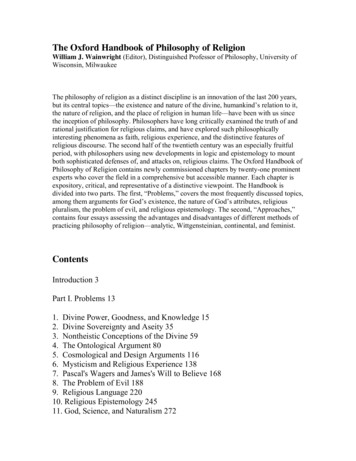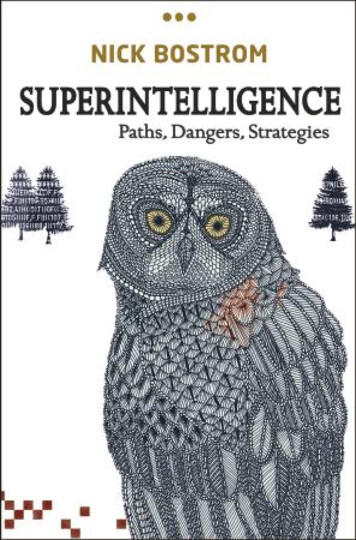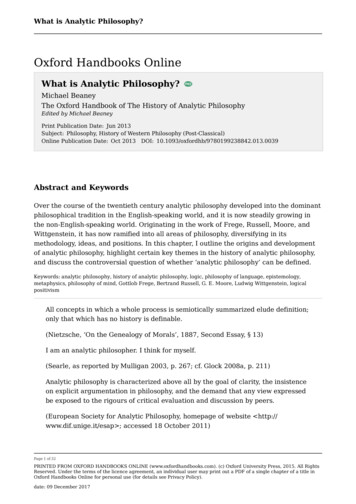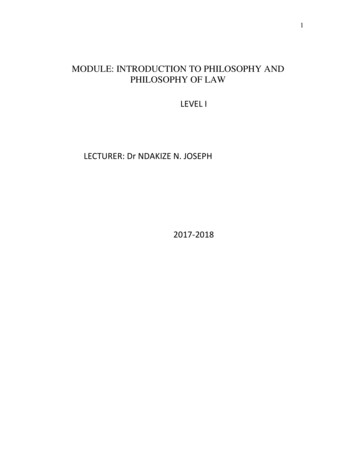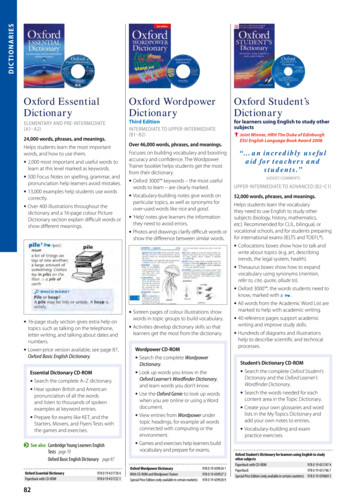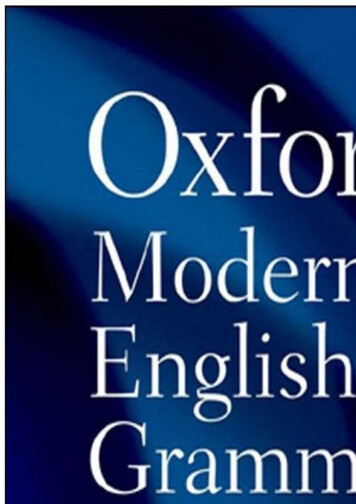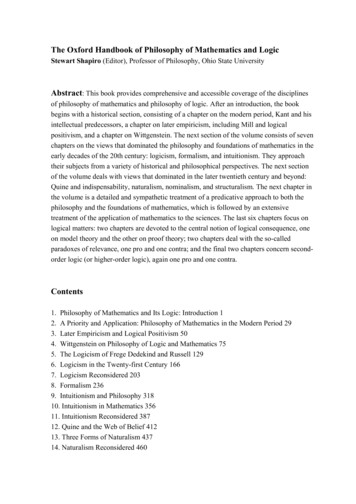
Transcription
The Oxford Handbook of Philosophy of Mathematics and LogicStewart Shapiro (Editor), Professor of Philosophy, Ohio State UniversityAbstract: This book provides comprehensive and accessible coverage of the disciplinesof philosophy of mathematics and philosophy of logic. After an introduction, the bookbegins with a historical section, consisting of a chapter on the modern period, Kant and hisintellectual predecessors, a chapter on later empiricism, including Mill and logicalpositivism, and a chapter on Wittgenstein. The next section of the volume consists of sevenchapters on the views that dominated the philosophy and foundations of mathematics in theearly decades of the 20th century: logicism, formalism, and intuitionism. They approachtheir subjects from a variety of historical and philosophical perspectives. The next sectionof the volume deals with views that dominated in the later twentieth century and beyond:Quine and indispensability, naturalism, nominalism, and structuralism. The next chapter inthe volume is a detailed and sympathetic treatment of a predicative approach to both thephilosophy and the foundations of mathematics, which is followed by an extensivetreatment of the application of mathematics to the sciences. The last six chapters focus onlogical matters: two chapters are devoted to the central notion of logical consequence, oneon model theory and the other on proof theory; two chapters deal with the so-calledparadoxes of relevance, one pro and one contra; and the final two chapters concern secondorder logic (or higher-order logic), again one pro and one contra.Contents1. Philosophy of Mathematics and Its Logic: Introduction 12. A Priority and Application: Philosophy of Mathematics in the Modern Period 293. Later Empiricism and Logical Positivism 504. Wittgenstein on Philosophy of Logic and Mathematics 755. The Logicism of Frege Dedekind and Russell 1296. Logicism in the Twenty-first Century 1667. Logicism Reconsidered 2038. Formalism 2369. Intuitionism and Philosophy 31810. Intuitionism in Mathematics 35611. Intuitionism Reconsidered 38712. Quine and the Web of Belief 41213. Three Forms of Naturalism 43714. Naturalism Reconsidered 460
15. Nominalism 48316. Nominalism Reconsidered 51517. Structuralism 53618. Structuralism Reconsidered 56319. Predicativity 59020. Mathematics—Application and Applicability 62521. Logical Consequence, Proof Theory, and Model Theory 65122. Logical Consequence: A Constructivist View 67123. Relevance in Reasoning 69624. No Requirement of Relevance 72725. Higher-order Logic 75126. Higher-order Logic Reconsidered 781PrefaceThis volume provides comprehensive and accessible coverage of the disciplines ofphilosophy of mathematics and philosophy of logic, including an overview of the majorproblems, positions, and battle lines. In line with the underlying theme of the series, eachauthor was given a free hand to develop his or her distinctive viewpoint. Thus, the variouschapters are not neutral. Readers see exposition and criticism, as well as substantialdevelopment of philosophical positions. I am pleased to report that each chapter breaksnew ground. The volume not only presents the disciplines of philosophy of mathematicsand philosophy of logic, but advances them as well.For many of the major positions in the philosophy of mathematics and logic, the bookcontains at least two chapters, at least one sympathetic to the view and one critical. Ofcourse, this does not guarantee that every major viewpoint is given a sympathetictreatment. For example, one of my own pet positions, ante rem structuralism, comes in forheavy criticism in two of the chapters, and is not defended anywhere (except briefly inchapter 1). In light of the depth and extent of the disciplines today, no single volume, orseries of volumes, can provide extensive and sympathetic coverage of even the majorpositions on offer. And there would hardly be a point to such an undertaking, since thedisciplines are ever evolving. New positions and new criticisms of old positions emergewith each issue of each major philosophy journal. Most of the chapters contain anextensive bibliography. In total, this volume provides a clear picture of the state of the art.There is some overlap between the chapters. This is to be expected in a work of this scope,and it was explicitly encouraged. Authors often draw interesting, but distinctive,conclusions from the same material. There is, of course, no sharp separation between thephilosophy of mathematics and the philosophy of logic. The main issues and views of
either discipline permeate those of the other. Just about every chapter deals with mattersmathematical and matters logical.After the Introduction (chapter 1), the book begins with a historical section, consisting ofthree chapters. Chapter 2 deals with the modern period—Kant and his intellectualpredecessors; chapter 3 concerns later empiricism, including John Stuart Mill and logicalpositivism; and chapter 4 focuses on Ludwig Wittgenstein.The volume then turns to the “big three” views that dominated the philosophy andfoundations of mathematics in the early decades of the twentieth century: logicism,formalism, and intuitionism. There are three chapters on logicism, one dealing with theemergence of the program in the work of Frege, Russell, and Dedekind (chapter 5); one onneologicism, the contemporary legacy of Fregean logicism (chapter 6); and one called“Logicism Reconsidered,” which provides a technical assessment of the program in its firstcentury (chapter 7). This is followed by a lengthy chapter on formalism, covering itshistorical and philosophical aspects (chapter 8). Two of the three chapters on intuitionismoverlap considerably. The first (chapter 9) provides the philosophical background tointuitionism, through the work of L. E. J. Brouwer, Arend Heyting, and others. The second(chapter 10) takes a more explicitly mathematical perspective. Chapter 11, “IntuitionismReconsidered,” focuses largely on technical issues concerning the logic.The next section of the volume deals with views that dominated in the later twentiethcentury and beyond. Chapter 12 provides a sympathetic reconstruction of Quinean holismand indispensability. This is followed by two chapters that focus directly on naturalism.Chapter 13 lays out the principles of some prominent naturalists, and chapter 14 is criticalof the main themes of naturalism. Next up are nominalism and structuralism, which gettwo chapters each. One of these is sympathetic to at least one variation on the view inquestion, and the other “reconsiders.”Chapter 19 is a detailed and sympathetic treatment of a predicative approach to both thephilosophy and the foundations of mathematics. This is followed by an extensive treatmentof the application of mathematics to the sciences; chapter 20 lays out different senses inwhich mathematics is to be applied, and draws some surprising philosophical conclusions.The last six chapters of the volume focus more directly on logical matters, in three pairs.There are two chapters devoted to the central notion of logical consequence. Chapter 21presents and defends the role of semantic notions and model theory, and chapter 22 takes amore “constructive” approach, leading to proof theory. The next two chapters deal with theso-called paradoxes of relevance, chapter 23 arguing that the proper notion of logicalconsequence carries a notion of relevance, and chapter 24 arguing against this. The finaltwo chapters concern higher-order logic. Chapter 25 presents higher-order logic andprovides an overview of its various uses in foundational studies. Of course, chapter 26reconsiders.Throughout the process of assembling this book, I benefited considerably from the sageadvice of my editor, Peter Ohlin, of Oxford University Press, USA, and from my
colleagues and friends, at Ohio State, St. Andrews, and other institutions. Thanksespecially to Penelope Maddy and Michael Detlefsen.Notes on the ContributorsJohn P. Burgess, Ph.D. in Logic, Berkeley (1975), has taught since 1976 at Princeton,where he is now Director of Undergraduate Studies. His interests include logic, philosophyof mathematics, metaethics, and pataphysics. He is the author of numerous articles onmathematical and philosophical logic and philosophy of mathematics, and of Fixing Fregeand (with Gideon Rosen) A Subject with No Object (Oxford University Press, 1997).Charles Chihara is Emeritus Professor of Philosophy at the University of California,Berkeley. He is the author of Ontology and the Vicious Circle Principle (1973),Constructibility and Mathematical Existence (Oxford University Press, 1990), The Worldsof Possibility: Model Realism and the Semantics of Modal Logic (Oxford University Press,1998), and A Structural Account of Mathematics (Oxford University Press, 2004).Peter J. Clark is Reader in Logic and Metaphysics and Head of the School ofPhilosophical and Anthropological Studies in the University of St. Andrews. He worksprimarily in the philosophy of physical science and mathematics and is editor of the BritishJournal for the Philosophy of Science.Roy Cook is a Visiting Professor at Villanova University and an Associate Fellow at theArché Research Centre at the University of St. Andrews. He has published on thephilosophy of logic, language, and mathematics in numerous journals includingPhilosophia Mathematica, Mind, The Notre Dame Journal of Formal Logic, The Journalof Symbolic Logic, and Analysis.William Demopoulos has published articles in diverse fields in the philosophy of the exactsciences, and on the development of analytic philosophy in the twentieth century. He is amember of the Department of Logic and Philosophy of Science of the University ofCalifornia, Irvine.Michael Detlefsen is Professor of Philosophy at the University of Notre Dame. He is theauthor of Hilbert's Program: An Essay on Mathematical Instrumentalism (1986) and editorof Notre Dame Journal of Formal Logic.Solomon Feferman is Professor of Mathematics and Philosophy and the Patrick SuppesProfessor of Humanities and Sciences, Emeritus, at Stanford University. He is the author ofnumerous articles on logic and the foundations of mathematics and of In the Light of Logic(Oxford University Press, 1998), editor in chief of the Collected Works of Kurt Gödel(vols. I–V, Oxford University Press, 1986–2003), and author with Anita B. Feferman ofTruth and Consequences: The Life and Logic of Alfred Tarski (forthcoming). Fefermanreceived the Rolf Schock Prize for Logic and Philosophy for 2003.
Juliet Floyd is Associate Professor of Philosophy at Boston University, working primarilyon the interplay between logic, mathematics, and philosophy in early twentieth-centuryphilosophy. She has written articles on Kant, Frege, Russell, Wittgenstein, Quine, andGödel, and (with Sanford Shieh) edited Future Pasts: The Analytic Tradition in TwentiethCentury Philosophy (Oxford University Press, 2001).Bob Hale is Professor of Metaphysical Philosophy at the University of Glasgow.Geoffrey Hellman is Professor of Philosophy at the University of Minnesota. He is authorof Mathematics Without Numbers (Oxford University Press, 1989) and edited QuantumMeasurement: Beyond Paradox (1998) with Richard Healey. He has published numerousresearch papers in philosophy of mathematics, philosophy of physics, and generalphilosophy of science. He also has an interest in musical aesthetics and remains active as aconcert pianist.Ignacio Jané is Professor of Philosophy in the Department of Logic and the History andPhilosophy of Science of the University of Barcelona. His main interests are in thefoundations of mathematics, philosophy of mathematics, and philosophy of logic. He is theauthor of “A Critical Appraisal of Second-order Logic” (History and Philosophy of Logic,1993), “The Role of Absolute Infinity in Cantor's Conception of Set” (Erkenntnis, 1995),and “Reflections on Skolem's Relativity of Set-Theoretical Concepts” (PhilosophiaMathematica, 2001).Fraser MacBride is a Reader in the School of Philosophy at Birkbeck College London. Hepreviously taught in the Department of Logic & Metaphysics at the University of St.Andrews and was a research fellow at University College London. He has written severalarticles on the philosophy of mathematics, metaphysics, and the history of philosophy, andis the editor of The Foundations of Mathematics and Logic (special issue of ThePhilosophical Quarterly, vol. 54, no. 214 January 2004).Penelope Maddy is Professor of Logic and Philosophy of Science at the University ofCalifornia, Irvine. Her work includes “Believing the Axioms” (Journal of Symbolic Logic,1988), Realism in Mathematics (Oxford University Press, 1990), and Naturalism inMathematics (Oxford University Press, 1997).D. C. McCarty is member of the Logic Program at Indiana University.Carl Posy is Professor of Philosophy at the Hebrew University of Jerusalem. His workcovers philosophical logic, the philosophy of mathematics, and the history of philosophy.He is editor of Kant's Philosophy of Mathematics: Modern Essays (1992). A recentpublication on logic and the philosophy of mathematics is “Epistemology, Ontology andthe Continuum” (in Mathematics and the Growth of Knowledge, E. Grossholz, ed., 2001).A recent paper on the history of philosophy is “Between Leibniz and Mill: Kant's Logicand the Rhetoric of Psychologism” (in Philosophy, Psychology, and Psychologism:Critical and Historical Readings on the Psychological Turn in Philosophy, D. Jacquette,ed., 2003).
Dag Prawitz is Professor of Theoretical Philosophy at Stockholm University, Emeritus (asof 2001). Most of his research is in proof theory, philosophy of mathematics, andphilosophy of language. Some early works include Natural Deduction: A ProofTheoretical Study (1965), “Ideas and Results in Proof Theory” (Proceedings of the SecondScandinavian Logic Symposium, 1971), and “Philosophical Aspects of Proof Theory”(Contemporary Philosophy, A New Survey, 1981). Some recent ones are “Truth andObjectivity from a Verificationist Point of View” (Truth in Mathematics, 1998), “Meaningand Objectivity” (Meaning and Interpretation, 2002), and replies to critic's in Theoria(1998) (special issue, “The Philosophy of Dag Prawitz”).Agustín Rayo received his degree from MIT in 2000, and then spent four years at theAHRB Research Centre for the Philosophy of Logic, Language, Mathematics, and Mind, atthe University of St Andrews. He is Assistant Professor of Philosophy at the University ofCalifornia, San Diego, and works mainly on the philosophy of logic, mathematics, andlanguage.Michael D. Resnik is University Distinguished Professor of Philosophy at the University ofNorth Carolina at Chapel Hill. He is the author of Mathematics as a Science of Patterns(Oxford University Press, 1997) and Frege and the Philosophy of Mathematics (1980), aswell as a number of articles in philosophy of mathematics and philosophy of logic.Gideon Rosen is Professor of Philosophy at Princeton University. He is the author (withJohn P. Burgess) of A Subject with No Object: Strategies for Nominalistic Interpretation ofMathematics (Oxford University Press, 1997).Lisa Shabel is an Assistant Professor of Philosophy at The Ohio State University. Herarticles include “Kant on the ‘Symbolic Construction’ of Mathematical Concepts” (Studiesin History of Philosophy of Science, 1998) and “Kant's ‘Argument from Geometry’ ”(Journal of the History of Philosophy, 2004). She has also published a monograph titledMathematics in Kant's Critical Philosophy: Reflections on Mathematical Practice (2003).Stewart Shapiro is the O'Donnell Professor of Philosophy at The Ohio State University andProfessorial Fellow in the Research Centre Arché, at the University of St. Andrews. Hispublications include Foundations Without Foundationalism: A Case for Second-orderLogic (Oxford University Press, 1991) and Philosophy of Mathematics: Structure andOntology (Oxford University Press, 1997).John Skorupski is Professor of Moral Philosophy at the University of St Andrews. Amonghis publications are John Stuart Mill (1989), English-Language Philosophy, 1750–1945(1993), and Ethical Explorations (1999).Mark Steiner is Professor of Philosophy at the Hebrew University of Jerusalem. Hereceived his B.A. from Columbia in 1965, was a Fulbright Fellow at Oxford in 1966, andreceived his Ph.D. at Princeton in 1972 (under Paul Benacerraf). He taught at Columbiafrom 1970 to 1977, when he joined the Philosophy Department of the Hebrew University.He is the author of Mathematical Knowledge (1975) and The Applicability of Mathematicsas a Philosophical Problem (1998).
Neil Tennant is Distinguished Humanities Professor at The Ohio State University. Hispublications include Anti-realism in Logic (Oxford University Press, 1987) and TheTaming of the True (Oxford University Press, 1997).Alan Weir is Senior Lecturer at Queen's University, Belfast, Northern Ireland. He has alsotaught at the universities of Edinburgh and Birmingham and at Balliol College, Oxford. Hehas published articles on logic and philosophy of mathematics in a number of journals,including Mind, Philosophia Mathematica, Notre Dame Journal of Formal Logic, andGrazer Philosophische Studien.Crispin Wright is Bishop Wardlaw Professor at the University of St. Andrews, GlobalDistinguished Professor at New York University, and Director of the Research Centre,Arché. His writings in the philosophy of mathematics include Wittgenstein on theFoundations of Mathematics (1980); Frege's Conception of Numbers as Objects (1983);and, with Bob Hale, The Reason's Proper Study (Oxford University Press, 2001). His mostrecent books, Rails to Infinity (2001) and Saving the Differences (2003), respectivelycollect his writings on central themes of Wittgenstein's Philosophical Investigations andthose further developing themes of his Truth and Objectivity (1992).1 Philosophy of Mathematics and Its Logic: IntroductionStewart Shapiro1. Motivation, or What We Are Up toFrom the beginning, Western philosophy has had a fascination with mathematics. Theentrance to Plato's Academy is said to have been marked with the words "Let no oneignorant of geometry enter here." Some major historical mathematicians, such as RenéDescartes, Gottfried Leibniz, and Blaise Pascal, were also major philosophers. In morerecent times, there are Bernard Bolzano, Alfred North Whitehead, David Hilbert, GottlobFrege, Alonzo Church, Kurt Gödel, and Alfred Tarski. Until very recently, just about everyphilosopher was aware of the state of mathematics and took it seriously for philosophicalattention.Often, the relationship went beyond fascination. Impressed with the certainty and depth ofmathematics, Plato made mathematical ontology the model for his Forms, andmathematical knowledge the model for knowledge generally—to the extent ofdownplaying or outright neglecting information gleaned from the senses. A similar themereemerged in the dream of traditional rationalists of extending whatend p.3
they took to be the methodology of mathematics to all scientific and philosophicalknowledge. For some rationalists, the goal was to emulate Euclid's Elements of Geometry,providing axioms and demonstrations of philosophical principles. Empiricists, the mainopponents of rationalism, realized that their orientation to knowledge does not seem tomake much sense of mathematics, and they went to some lengths to accommodatemathematics—often distorting it beyond recognition (see Parsons [1983, essay 1]).Mathematics is a central part of our best efforts at knowledge. It plays an important role invirtually every scientific effort, no matter what part of the world it is aimed at. There isscarcely a natural or a social science that does not have substantial mathematicsprerequisites. The burden on any complete philosophy of mathematics is to show howmathematics is applied to the material world, and to show how the methodology ofmathematics (whatever it may be) fits into the methodology of the sciences (whatever itmay be). (See chapter 20 in this volume.)In addition to its role in science, mathematics itself seems to be a knowledge-gatheringactivity. We speak of what theorems a given person knows and does not know. Thus, thephilosophy of mathematics is, at least in part, a branch of epistemology. However,mathematics is at least prima facie different from other epistemic endeavors. Basicmathematical principles, such as "7 5 12" or "there are infinitely many primenumbers," are sometimes held up as paradigms of necessary truths and, a priori, infallibleknowledge. It is beyond question that these propositions enjoy a high degree of certainty—however this certainty is to be expounded. How can these propositions be false? How canany rational being doubt them? Indeed, mathematics seems essential to any sort ofreasoning at all. Suppose, in the manner of Descartes's first Meditation, that one managesto doubt, or pretend to doubt, the basic principles of mathematics. Can he go on to think atall?In these respects, at least, logic is like mathematics. At least some of the basic principles oflogic are, or seem to be, absolutely necessary and a priori knowable. If one doubts thebasic principles of logic, then, perhaps by definition, she cannot go on to think coherentlyat all. Prima facie, to think coherently just is to think logically.Like mathematics, logic has also been a central focus of philosophy, almost from the verybeginning. Aristotle is still listed among the four or five most influential logicians ever,and logic received attention throughout the ancient and medieval intellectual worlds.Today, of course, logic is a thriving branch of both mathematics and philosophy.It is incumbent on any complete philosophy of mathematics and any complete philosophyof logic to account for their at least apparent necessity and apriority. Broadly speaking,there are two options. The straightforward way to show that a given discipline appears acertain way is to demonstrate that it is that way. Thus the philosopher can articulate the
notions of necessity and apriority, and then show how they apply to mathematics and/orlogic. Alternatively, the philosopher canend p.4argue that mathematics and/or logic does not enjoy these properties. On this option,however, the philosopher still needs to show why it appears that mathematics and/or logicis necessary and a priori. She cannot simply ignore the long-standing belief concerning thespecial status of these disciplines. There must be something about mathematics and/orlogic that has led so many to hold, perhaps mistakenly, that they are necessary and a prioriknowable.The conflict between rationalism and empiricism reflects some tension in the traditionalviews concerning mathematics, if not logic. Mathematics seems necessary and a priori, andyet it has something to do with the physical world. How is this possible? How can we learnsomething important about the physical world by a priori reflection in our comfortablearmchairs? As noted above, mathematics is essential to any scientific understanding of theworld, and science is empirical if anything is—rationalism notwithstanding. ImmanuelKant's thesis that arithmetic and geometry are synthetic a priori was a heroic attempt toreconcile these features of mathematics. According to Kant, mathematics relates to theforms of ordinary perception in space and time. On this view, mathematics applies to thephysical world because it concerns the ways that we perceive the physical world.Mathematics concerns the underlying structure and presuppositions of the natural sciences.This is how mathematics gets "applied." It is necessary because we cannot structure thephysical world in any other way. Mathematical knowledge is a priori because we canuncover these presuppositions without any particular experience (chapter 2 of this volume).This set the stage for over two centuries of fruitful philosophy.2. Global MattersFor any field of study X, the main purposes of the philosophy of X are to interpret X and toilluminate the place of X in the overall intellectual enterprise. The philosopher ofmathematics immediately encounters sweeping issues, typically concerning all ofmathematics. Most of these questions come from general philosophy: matters of ontology,epistemology, and logic. What, if anything, is mathematics about? How is mathematicspursued? Do we know mathematics and, if so, how do we know mathematics? What is themethodology of mathematics, and to what extent is this methodology reliable? What is theproper logic for mathematics? To what extent are the principles of mathematics objectiveand independent of the mind, language, and social structure of mathematicians? Some
problems and issues on the agenda of contemporary philosophy have remarkably cleanformulations when applied to mathematics. Examples include matters of ontology, logic,objectivity, knowledge, and mind.end p.5The philosopher of logic encounters a similar range of issues, with perhaps less emphasison ontology. Given the role of deduction in mathematics, the philosophy of mathematicsand the philosophy of logic are intertwined, to the point that there is not much use inseparating them out.A mathematician who adopts a philosophy of mathematics should gain something by this:an orientation toward the work, some insight into the role of mathematics, and at least atentative guide to the direction of mathematics—What sorts of problems are important?What questions should be posed? What methodologies are reasonable? What is likely tosucceed? And so on?One global issue concerns whether mathematical objects—numbers, points, functions, sets—exist and, if they do, whether they are independent of the mathematician, her mind, herlanguage, and so on. Define realism in ontology to be the view that at least somemathematical objects exist objectively. According to ontological realism, mathematicalobjects are prima facie abstract, acausal, indestructible, eternal, and not part of space andtime. Since mathematical objects share these properties with Platonic Forms, realism inontology is sometimes called "Platonism."Realism in ontology does account for, or at least recapitulate, the necessity of mathematics.If the subject matter of mathematics is as these realists say it is, then the truths ofmathematics are independent of anything contingent about the physical universe andanything contingent about the human mind, the community of mathematicians, and so on.What of apriority? The connection with Plato might suggest the existence of a quasimystical connection between humans and the abstract and detached mathematical realm.However, such a connection is denied by most contemporary philosophers. As aphilosophy of mathematics, "platonism" is often written with a lowercase 'p,' probably tomark some distance from the master on matters of epistemology. Without this quasimystical connection to the mathematical realm, the ontological realist is left with a deepepistemic problem. If mathematical objects are in fact abstract, and thus causally isolatedfrom the mathematician, then how is it possible for this mathematician to gain knowledgeof them? It is close to a piece of incorrigible data that we do have at least somemathematical knowledge. If the realist in ontology is correct, how is this possible?Georg Kreisel is often credited with shifting attention from the existence of mathematicalobjects to the objectivity of mathematical truth. Define realism in truth-value to be theview that mathematical statements have objective truth-values independent of the minds,languages, conventions, and such of mathematicians. The opposition to this view is anti-
realism in truth-value, the thesis that if mathematical statements have truth-values at all,these truth-values are dependent on the mathematician.There is a prima facie alliance between realism in truth-value and realism in ontology.Realism in truth-value is an attempt to develop a view that mathematicsend p.6deals with objective features of the world. Accordingly, mathematics has the objectivity ofa science. Mathematical (and everyday) discourse has variables that range over numbers,and numerals are singular terms. Realism in ontology is just the view that this discourse isto be taken at face value. Singular terms denote objects, and thus numerals denotenumbers. According to our two realisms, mathematicians mean what they say, and most ofwhat they say is true. In short, realism in ontology is the default or the first guess of therealist in truth-value.Nevertheless, a survey of the recent literature reveals that there is no consensus on thelogical connections between the two realist theses or their negations. Each of the fourpossible positions is articulated and defended by established philosophers of mathematics.There are thorough realists (Gödel [1944, 1964], Crispin Wright [1983] and chapter 6 inthis volume, Penelope Maddy [1990], Michael Resnik [1997], Shapiro [1997]); thoroughanti-realists (Michael Dummett [1973, 1977]) realists in truth-value who are anti-realists inontology (Geoffrey Hellman [1989] and chapter 17 in this volume, Charles Chihara [1990]and chapter 15 in this volume); and realists in ontology who are anti-realists in truth-value(Neil Tennant [1987, 1997]).A closely related matter concerns the relationship between philosophy of mathematics andthe practice of mathematics. In recent history, there have been disputes concerning someprinciples and inferences within mathematics. One example is the law of excluded middle,the principle that for every sentence, either it or its negation is true. In symbols: AV A. Fora second example, a definition is impredicative if it refers to a class that contains the objectbeing defined. The usual definition of "the least upper bound" is impredicative because itdefines a particular upper bound by referring to the set of all upper bounds. Such principleshave been criticized on philosop
1. Philosophy of Mathematics and Its Logic: Introduction 1 2. A Priority and Application: Philosophy of Mathematics in the Modern Period 29 3. Later Empiricism and Logical Positivism 50 4. Wittgenstein on Philosophy of Logic and Mathematics 75 5. The Logicism of Frege Dedekind and Russell 129 6. Logicism in the Twenty-first Century 166 7.


